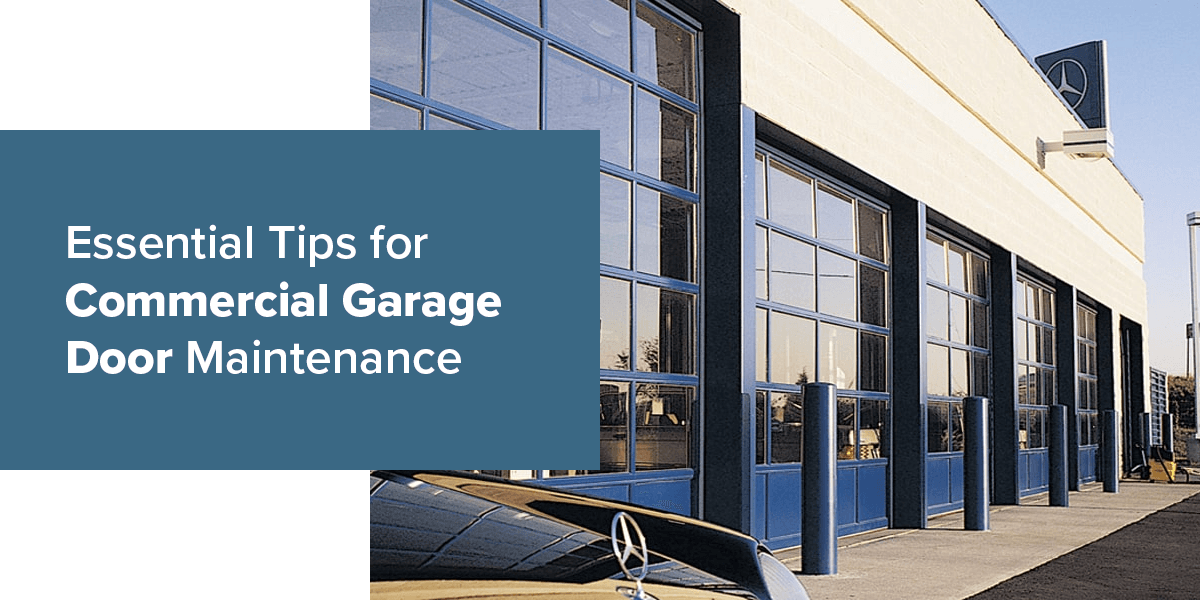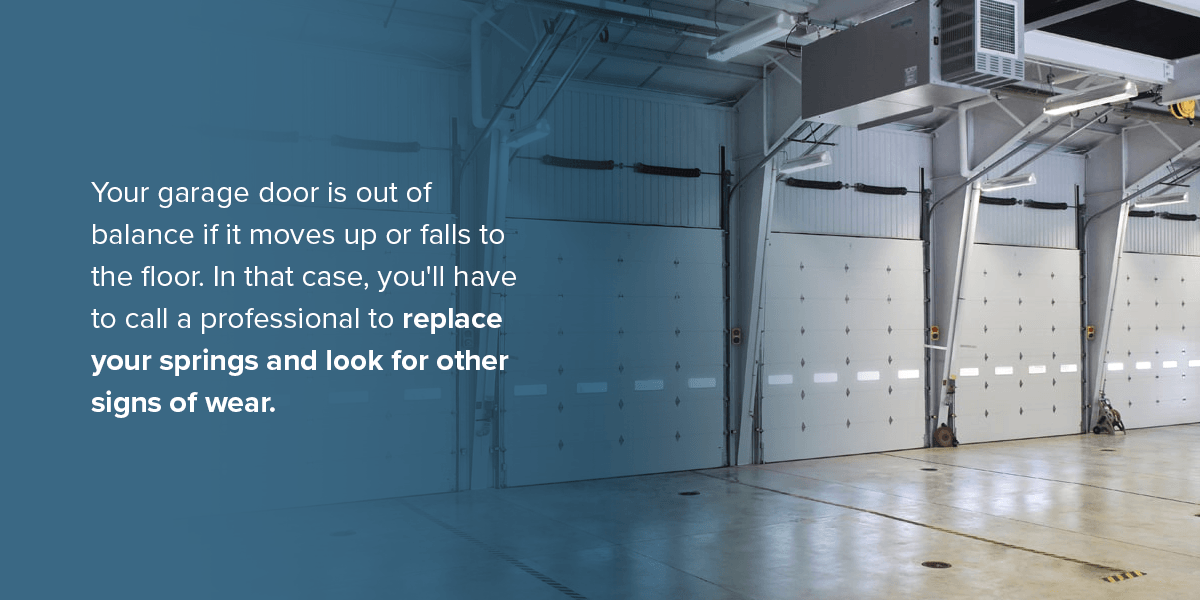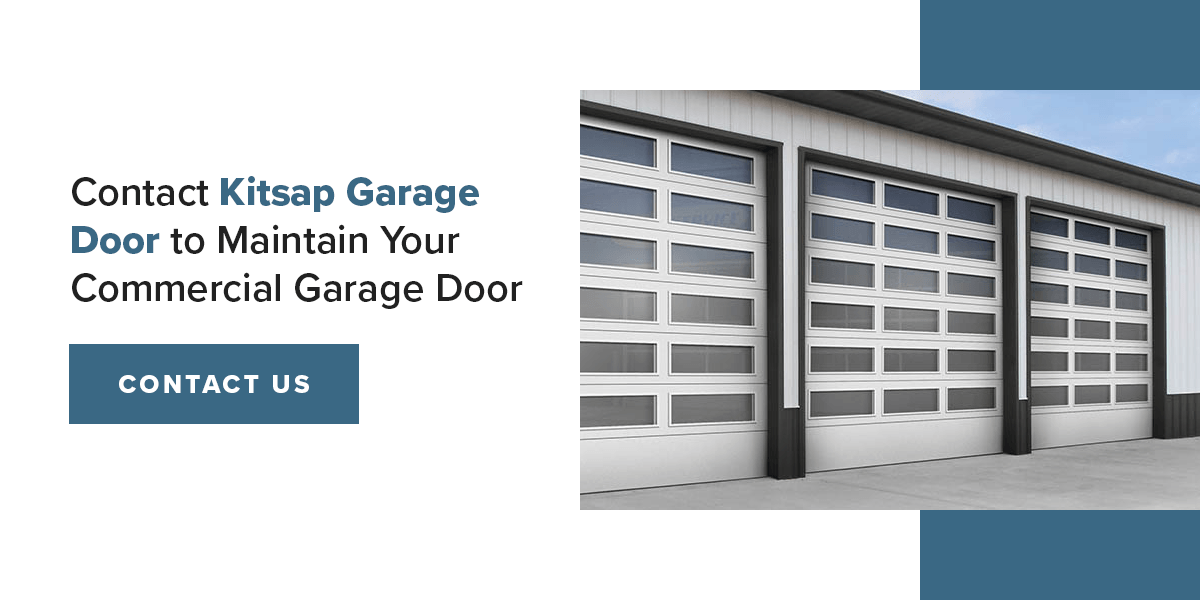Maintenance Tips for Commercial Garage Doors

Your garage may be home to your company’s vehicles, inventory and other valuables. It’s important to maintain your garage door at least once a season to reduce energy costs and provide a more efficient work environment. Follow these overhead garage door maintenance tips to prolong your doors’ life spans and keep it in working order.
1. Lubricate Moving Parts
Your garage door’s metal parts need lubrication to operate smoothly. Remove the dust and debris from these components before applying a lubricant. You should use a product designed for your garage door’s material, and follow the manufacturer’s instructions for application.
Lubricate the following garage door parts:
- Hinges: The hinges connect your garage door panels. Apply lubricant to your metal hinges at their pivot points. Since plastic can wear down when exposed to this product, avoid lubricating your hinges if they’re plastic.
- Rollers: Your garage door’s rollers allow it to travel up and down along the track. Lubricate metal rollers to keep your door moving smoothly. Try not to get lubricant on any nylon materials you may have in your garage door.
- Springs: The torsion springs lift and lower your garage door. Carefully lubricate these components to increase mobility and prolong their life span.
2. Clear Debris From Tracks
It helps to make a habit of cleaning your commercial garage door to enhance curb appeal and reduce potential damage. The tracks and rollers need to be clean and clear for your door to operate smoothly. As you remove debris from these parts, put any vehicles and other nearby equipment somewhere else.
Wipe out the tracks with a soft cloth with the door closed. Then, you can open the door and remove debris from the lower tracks. After cleaning these parts, you’ll want to apply a lubricant to make sure they operate smoothly.
3. Tighten Any Loose Bolts
Over time, the bolts in your garage door could become loose because of wear and tear or debris. As you inspect your door, take a screwdriver and tighten any loose screws and bolts you find. Pay special attention to these areas:
- Brackets: Mounting brackets hold the tracks to your walls. Check these components for loose screws or nuts to keep your garage door moving safely. You should also make sure the tracking system is level as you inspect the bolts.
- Spring plates: Check the screws of the plates holding your swing-up door’s springs.
- Hinges: Inspect the screws holding the sections of your garage door in place. The screw holes may have become bigger, so you’ll have to replace the screws for a firm fit.
4. Check All Pulleys and Cables for Wear and Tear
The pulleys and cables work together to open and close your garage door. Part of your garage door maintenance involves checking this system for wear. If your cables look frayed, try to figure out what might have damaged them. Clean them and avoid using heavy lubricants that attract dirt. You may also want to contact a professional garage door technician to replace your worn-out cables.
You’ll need to call an expert if your garage door has torsion springs. These parts store a lot of energy and can be dangerous when they break. A professional is aware of this potential and knows how to manage your torsion springs safely.

5. Check the Door’s Balance
An imbalanced garage door can reduce performance and wear out parts prematurely. Check your garage door’s balance by following these steps:
- Completely close your garage door and disconnect it from your automatic opener.
- Open your garage door manually until it’s situated halfway in the opening.
- Let go of the door and look at it from a few feet away.
Your garage door is out of balance if it moves up or falls to the floor. In that case, you’ll have to call professional service technicians to replace your springs and look for other signs of wear.
6. Look for Damaged Parts
Any damage to your garage door could lead to a decline in its life span. Check the following parts for wear and repair them as necessary:
- Rollers: The garage door’s rollers can wear out or become damaged over time. You’ll need new ones if the door gets stuck or moves in a jerky motion.
- Hardware: Bolts, hinges and other metal parts can rust and affect your door’s operation. Lubricating metal parts and tightening loose bolts usually fix these issues. If you still have problems after caring for the hardware pieces, you may need to replace them.
- Broken panels: Depending on your garage door’s material, you may find different types of panel damage. You’ll need to replace panel pieces with dents, rot, cracks or other signs of wear and tear.
7. Check the Weather Seals
The weatherstripping under and around your garage door keeps out drafts and pests and lowers your utility bills. You’ll need to check this seal at least twice a year when the door is closed. Contact a professional garage door technician to replace the weatherstripping if you notice the following signs of wear:
- Rusted or brittle metal around the garage door
- Gaps or cracks under or around your garage door
- Puddles of water around your garage door
- Drafts coming in through the door
8. Look for Rust and Repair as Necessary
Most modern steel garage doors are resistant to rust, but older ones eventually corrode. Check the bottom of your door where precipitation, sand or road salt can accumulate. You may also have rust on your garage door if your facility is in an environment with salty, humid air. Instead of trying to fix the rust yourself, reach out to your garage door manufacturer and check your warranty. Most of these plans cover rust repair, so you’d need a professional to deal with any corrosion you find.
You may want to replace your garage door if it’s old and the rust has spread. It’s also possible to get an individual panel replaced if the damage is minimal. An expert technician can help you come up with the best course of action.
9. Check the Door’s Insulation
A modern garage door usually comes with polyurethane or polystyrene insulation between two steel or wood panels. Having this protection for your door can keep your workspace comfortable and lower your energy bills. It also makes your door more durable against heavy winds.
You may need to replace your garage door insulation if you notice drafts coming in and your energy bills starting to increase. If you have an older door, consider upgrading to an energy-efficient one to save money and have more protection over time.
Contact Kitsap Garage Door to Maintain Your Commercial Garage Door
At Kitsap Garage Door, we offer commercial garage door repair and maintenance for business owners in Kitsap, Washington, and beyond. If you decide your business needs a garage door replacement, explore our collection of energy-efficient, high-quality Clopay® commercial garage doors. You can reach out to us online or call 360-692-0849 to schedule an inspection or request an estimate.


